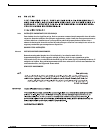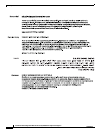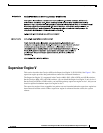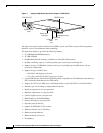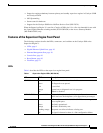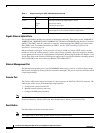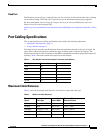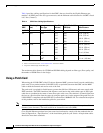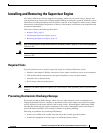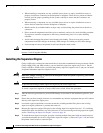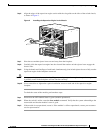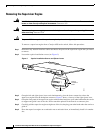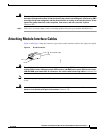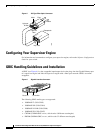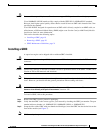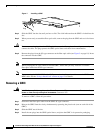
13
Installation and Configuration Note for the Catalyst 4500 Series Supervisor Engine V
78-15590-02
Installing and Removing the Supervisor Engine
Installing and Removing the Supervisor Engine
All Catalyst 4500 series switches support hot swapping, which lets you install, remove, replace, and
rearrange supervisor engines and switching modules without powering the system off. When the system
detects that a switching module has been installed or removed, it runs diagnostic and discovery routines
automatically, acknowledges the presence or absence of the module, and resumes system operation with
no operator intervention.
This section contains the following subsections:
• Required Tools, page 13
• Installing the Supervisor Engine, page 14
• Removing the Supervisor Engine, page 16
Warning
Only trained and qualified personnel should be allowed to install, replace, or service this equipment.
Statement 1030
Warning
Ultimate disposal of this product should be handled according to all national laws and regulations.
Statement 1040
Required Tools
You will need these tools to install a supervisor engine in a Catalyst 4500 series switch:
• Number 1 and number 2 Phillips screwdrivers for the captive installation screws on most modules
• 3/16-inch flat-blade screwdriver for the captive installation screws on other modules
• Antistatic mat or antistatic foam
• Wrist strap or other grounding device
Note Whenever you handle supervisor engines, use a wrist strap or other grounding device to prevent ESD
damage.
Preventing Electrostatic Discharge Damage
Electrostatic discharge (ESD) damage, which can occur when electronic cards or components are
improperly handled, results in complete or intermittent failures. Port adapters and processor modules
consist of printed circuit boards that are fixed in metal carriers. Electromagnetic interference (EMI)
shielding and connectors are integral components of the carrier. Although the metal carrier helps to
protect the board from ESD, use a preventive antistatic strap during handling.
Following are guidelines for preventing ESD damage:
• Always use an ESD wrist or ankle strap and ensure that it makes good skin contact.
• Connect the equipment end of the strap to an unfinished chassis surface.



